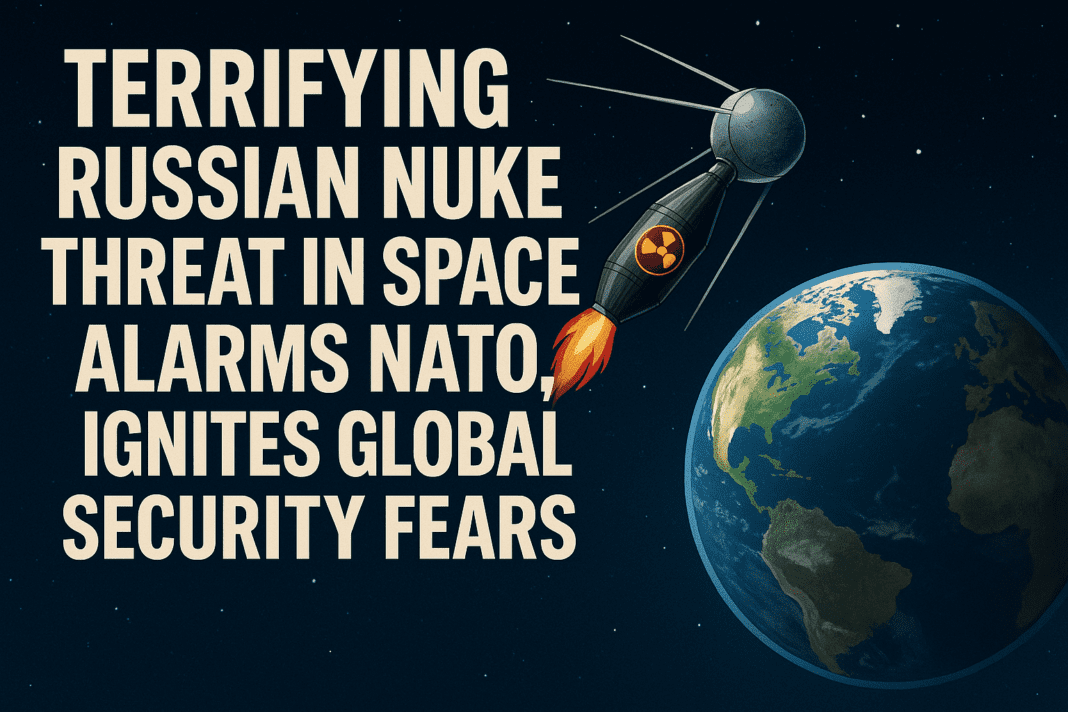NATO is deeply worried that Russia might be trying to put nuclear weapons in space. This nuke fear comes after new reports suggested that Moscow is exploring dangerous new technology that could be used far above Earth.
Russia May Be Planning to Send Nukes in Space
NATO’s Secretary-General, Mark Rutte, spoke to a German newspaper and said that this development could become a serious problem for the whole world. He said, “The development of nuclear weapons in space is a way for Russia to improve its capabilities. This is very worrying.”
Placing nuclear weapons in space could give Russia an unfair advantage and also cause serious damage to the global satellite systems that people and governments depend on every day.
There are around 7,000 satellites currently orbiting the Earth. These satellites are used for phone calls, internet, banking, GPS, weather forecasts, and military operations. If even a few of them are damaged, it could cause massive confusion and chaos in the world.
Earlier last month, Spacetechtimes has reported about the Russian Nukes
Mark Rutte pointed out that space is now just as important as land, air, sea, and cyberspace. He said, “Space has become crowded, dangerous, and unpredictable. We know that competition in space is fierce.”
Russia has not clearly confirmed these reports, but it did recently block a resolution at the United Nations that asked countries not to put nuclear weapons in space. This action has made people suspicious of Russia’s true intentions.
The Risks Are Bigger Than Most People Think
The biggest concern is what would happen if a nuclear device exploded in space. While such a blast might not kill anyone directly, it could destroy or disable many satellites using what’s known as an electromagnetic pulse, or EMP.
An EMP can fry the electronics of nearby satellites, making them useless. It could also affect equipment on Earth, including power stations, hospitals, military networks, and anything else that relies on electronic systems.
Nuclear Risk: How Russia’s New Space Station Could Prevent Conflict
That means simple things like using your phone, checking the weather, or withdrawing money from an ATM could become impossible in the case of a major satellite failure.
This is not just science fiction. Experts warn that a nuclear explosion in space could damage satellites far beyond the explosion area. This is because of the radiation and particles it would release, which can spread widely and stay in space for years.
It could also create a dangerous debris field. Broken satellite parts flying through space could damage other satellites and even threaten astronauts on the International Space Station.
For NATO, this is not just a technical issue. It is a defense issue. Many countries in NATO, including the United States, use satellites for military operations. These satellites help with surveillance, communication, missile tracking, and more.
If those systems were suddenly turned off or damaged, countries could be left blind and vulnerable in a conflict.
What NATO and the World Are Doing About It
The idea of banning weapons in space is not new. In 1967, the Outer Space Treaty was signed by countries including Russia, the United States, and others. It banned putting nuclear weapons or other weapons of mass destruction into orbit.
Switzerland Steps In as Tensions Mount Over Militarization of Space
But experts say the treaty is now outdated. It does not fully cover modern weapons or current threats, especially when it comes to new satellite-killing technology.
Russia’s recent move at the United Nations raised many alarms. In April 2024, Russia vetoed a resolution that would have confirmed the global commitment to keep space free of nuclear weapons. This led to questions about why Russia would oppose such a peaceful idea.
Meanwhile, NATO is taking steps to prepare for any space-related threats. Countries are sharing intelligence and building national space command centers. These centers help monitor satellite activity and respond to potential attacks.
Some NATO members are also working on building smaller, faster, and more maneuverable satellites. These newer satellites are harder to track and destroy, making them safer in case of conflict.
You May Also Like to Read: Space Collaborations
The United States and its allies are also increasing cooperation in space security. Space is no longer a peaceful place where only science happens. It is now an area of serious military interest, and countries are racing to protect their assets.
While no nuclear weapons have yet been placed in space, the fear is real. If Russia moves forward with such a plan, it could spark a new kind of arms race—not on Earth, but in the sky above us.
NATO has urged countries to come together and create better rules and stronger agreements to prevent any country from placing nuclear weapons in orbit.
The hope is that space can remain a peaceful and shared area. But if nuclear weapons enter orbit, it could change the future of warfare forever.
The world is now watching closely. The next steps taken by Russia and NATO will shape not just global politics, but the safety of space itself.




